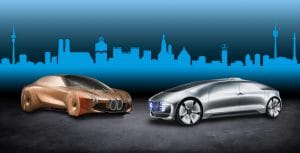
Daimler and BMW put the brakes on a joint development agreement for automated driving technology. The two said the hold was temporary.
BMW and Daimler are hitting the pause button on joint development efforts of automated vehicles.
The pandemic has raised new questions about the future of self-driving vehicles at a time when technical development of vehicles that can drive themselves outside of a fixed area are proving is proving difficult and, as a result, investors have grown more skeptical of the technology’s future.
The BMW Group and Mercedes-Benz AG said in a statement they are putting their cooperation on development of next-generation technology for automated driving temporarily on hold.
(Audi joining BMW Daimler autonomous vehicle partnership.)
The decision follows an extensive review, the two companies have arrived at a mutual and amicable agreement to concentrate on their existing development paths – which may also include working with current or new partners.
Both explicitly wished to stress “that cooperation may be resumed at a later date and that the two organizations’ underlying approach to matters such as safety and customer benefits in the field of automated driving remains highly compatible,” the statement said.
BMW Group and Mercedes-Benz also are both working separately on current generations for highly automated driving and have achieved major progress in this field in the past.
The companies were unable to hold detailed discussions to formulate plans about various aspects of the partnership, such as suppliers, technology, a timeline, etc. However, after the deal was signed last year, and the two sides began talking, each concluded that when factors like expenses, the current business and economic client, it didn’t make sense to go forward now. However, they will continue working individually.
“We have systematically further developed our technology and scalable platform with partners like Intel, Mobileye, FCA and Ansys,” said Klaus Fröhlich, member of the Board of Management of BMW AG, responsible for Development.
(BMW, Daimler ink long-term autonomous vehicle development deal.)
“Our current technology generation offers very strong, sustainable potential: With extremely powerful sensors and computing power, our robust modular system puts us in an excellent position to offer our customers what they need for many years.”
Markus Schäfer, Member of the Board of Management of Daimler AG and Mercedes-Benz AG; responsible for Daimler Group Research and Mercedes-Benz Cars COO, noted that there are plenty of pressing issues for each company to tackle now and that each can return to this area at a later day.
“Our expertise complements that of the BMW Group very well, as our successful collaborations have proved. Next to decarbonisation, digitalization is a central strategic pillar for Mercedes-Benz,” he said.
“To prepare for the future challenges of a rapidly changing environment, we are currently also sounding out other possibilities with partners outside the automotive sector.”
Other elements of cooperative initiatives will continue, the two companies said.
(Daimler, BMW pulls the plug on car sharing effort in U.S., Canada.)
In 2015, the two companies joined with Audi AG to acquire the location and technology platform HERE, which now has a very broad and international shareholder structure. In early 2019, the BMW Group and Daimler AG also pooled their mobility services in a joint venture under the umbrella of the NOW family.
